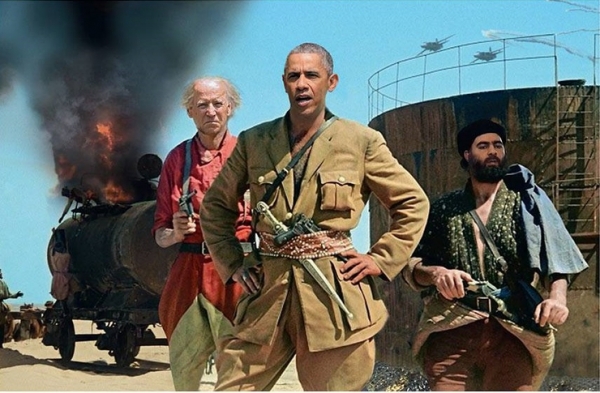
Of the impending death of the oil cartel has long been warned by many experts, however, according to former chief economist at NGP Energy Capital Management ANAS Alhaji, OPEC has long been dead.
In his article on Project Syndicate ANAS Alhaji writes that the death of the oil cartel to blame for his key player – Saudi Arabia.
The organization of countries-exporters of oil, OPEC is dead. She was killed in Saudi Arabia. Now OPEC is just a toothless zombie: it attracts attention, but does not have to life any influence.
Few noticed the demise of OPEC, and for a simple reason: the organization is never in reality had that effect, which is usually attributed. She never was a real cartel with monopolistic market power. Anyone who thinks otherwise erroneously attributed to her market power of Saudi Arabia.
And the market power of Saudi Arabia big. This country remains the dominant producer of world oil markets; of its political and economic decisions depend on the entire global energy economy. And this influence will only increase if the Kingdom will be able to turn the Arab Light oil in the new global benchmark grade of crude oil.
Of course, the new participants of the games energy producers theoretically able to strike on the positions of Saudi Arabia. However, until now, the Kingdom managed to avoid serious damage. For example, the shale revolution in the US has had a huge impact on world energy markets, a much larger than expected. For the first time in the past half century, countries of the Atlantic region was formed an oil surplus: they produce more oil than they consume. The only place of attraction for the oil exporters of steel Pacific countries. The surge of shale oil production in the US has led to the fact that the share of some OPEC countries (Algeria, Angola, Nigeria) in the us market was seriously reduced.
However, the shale revolution had a great impact on such countries as Saudi Arabia, Iraq or Kuwait, because of the difference in the quality of the oil. Algeria, Angola and Nigeria have exported to the USA light sweet crude oil, which the quality is comparable with shale oil. Meanwhile, many U.S. refineries are still configured for processing heavier and sour grades of oil imported from the Middle East. In the end, the market share of Saudi Arabia in the United States found themselves in comparative safety.
This does not mean that Saudi Arabia is invincible. On the contrary, she declined the share in the markets of the largest importers of oil in Asia. These countries increased purchases of West African oil lost demand in the US). But perhaps most painful for the Saudi Kingdom has lost significant market share in China, which went to Russia.
Russian penetration into the Chinese market contributed to the introduction of Western sanctions after Russia’s attack on Ukraine and annexation of Crimea in 2014, China took full advantage of the desperate situation of the Kremlin, guaranteeing extremely low prices for the purchase of Russian energy. However, as soon as they opened the door to Asia, the Russian company seized the opportunity to enter the market of petroleum products in India and Indonesia. But these two countries are critically important to the strategic plans of Saudi Arabia.
During the past two years, Saudi Arabia has given clearly to understand all that is not going to easily give up their share in the world markets to anyone. She began a campaign to restore the former positions in the oil market, but also in the markets of oil products, liquefied natural gas, petrochemicals. This Kingdom went on the price war, increasing oil production with the aim to displace weaker competitors.
Initially, Saudi Arabia zeroed in on the shale industry. However, over time its strategy of asserting dominance in global energy markets have evolved, adapting to new economic information and political circumstances. In the end, Saudi Arabia was dragged into a price war, all countries of OPEC. These States stepped up production to maximum levels, which naturally led to falling prices. When the output has reached a peak, the oil markets have disappeared to the bottom of the OPEC countries were forced to engage in direct price competition among themselves.
All this has resulted in irreparable internal divisions. It is a painful way was manifested at the April OPEC meeting in Doha, where was derailed by the signing of an agreement to freeze production levels. Saudi Arabia refused to cut production if the same is not received by Iran. But Iran (which, like Russia, suffered from Western sanctions, losing significant market share) refused to cut production. The producers lost their share of the American market, also do not intend to reduce production.
Saudi Arabia now understands that low oil prices will not allow it to fully recover market share in Asia and Europe. But at the same time she can’t see no more benefit from OPEC – the organization, which she also imposed on the world in 1973 with the first Arab oil embargo and since then used as a shield to implement its oil policy. When the U.S. shale revolution has transformed OPEC into a useless structure, Saudi Arabia has decided that there is no reason to keep alive his creation.
All this does not mean, however, that we have no hope for the resumption of energy cooperation. Saudi Arabia is now undergoing a major reform external economic and energy policies. Her example is the forthcoming partial privatization of Aramco, the state oil company, which is going to expand refining capacity.
It can be assumed that in energy markets the competition will shift from oil to refinery products. Thus, there will be new opportunities for cooperation: producers with large capacities for processing and storage of oil could buy the surpluses of oil producers, to whom such capacity is not enough.
The transition from competition in the oil markets to competition on oil markets will have a profound impact on the global oil industry, as well as on related areas, such as Maritime transport. It is highly likely that eventually this will lead to improving the overall efficiency of the oil market and help oil-producing countries to cope better with market volatility. To dominate manufacturers and refiners with the most advanced technologies – the list starts with Saudi Arabia.






